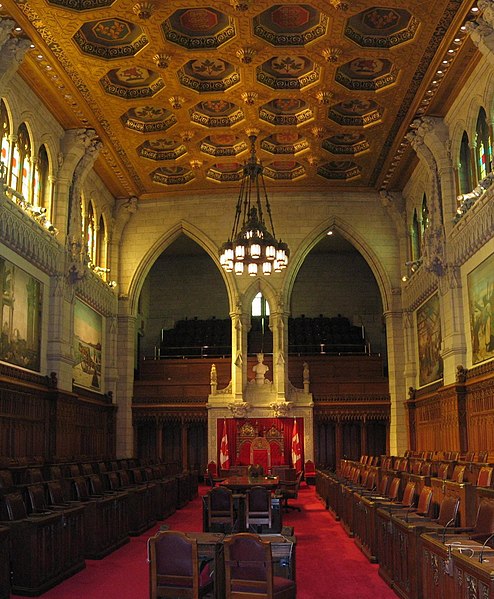When Stephen Harper closed out 2008 by appointing 18 new Senators he was accused of sounding the death knell for his own Senate reform agenda.
Instead, it seems that the move may have been a prelude to some smaller reforms.
 Among some of the reforms being considered include a proposal to abolish the $4,000 property ownership requirement, as suggested by Liberal Senator Tommy Banks. Conservative Senator Hugh Segal believes Senate proceedings should be televised. Bert Brown and David Oliver are suggesting reforms to the Senate committee system and possibly even abolishing question period in the Senate (certainly a questionable move).
Among some of the reforms being considered include a proposal to abolish the $4,000 property ownership requirement, as suggested by Liberal Senator Tommy Banks. Conservative Senator Hugh Segal believes Senate proceedings should be televised. Bert Brown and David Oliver are suggesting reforms to the Senate committee system and possibly even abolishing question period in the Senate (certainly a questionable move).With 18 new Senators in the ranks, however, Harper and the Conservatives certainly have renewed strength in the Senate to help push through their reform agenda.
But if renewing efforts to institute Senate elections and term limits isn't on the Harper government's immediate agenda, they'd better get on with it.
Alberta's senators in waiting Link Byfield and Betty Unger have been touring the country urging provincial leaders to choose their recommendations for future Senators before any future appointments can be made -- or before the Tories lose office.


I have the same reservations about Senate reform as I do abolishing the monarchy-it seems like we risk going ahead without considering the exact implications of what we're doing.
ReplyDeleteSome of the modest reforms you suggest make sense, like abolishing property requirements and televising Senate proceedings (something CPAC already does with some of the Senate committees), but to what point do we want to make large-scale changes to the Senate?
-Do we go for provincial recommendations or otherwise have provincial appointees to the Senate, as Claude Ryan suggested in the 1980 Beige Paper? If so, then how does that mesh with Stephen Harper's ideas of "open federalism", where it seems like the provinces can intervene or otherwise directly influence federal decision-making, but the federal government cannot otherwise become involved in provincial jurisdiction at any time? Does this mean Canadian intergovernmental relations only work one way?
-If we make the Senate elected, then does that mean they acquire a lot more legitimacy than they otherwise would? According to constitutional convention, the Senate now largely makes smaller bread-and-butter amendments to legislation passed by the House of Commons, or otherwise investigates policy matters that House parliamentary committees do. It has settled for this secondary advisory role because it doesn't want to be seen as overriding the will of the democratically elected representatives of the people.
If you open the whole thing up to elections, however, people will begin running with their own platforms, either as political independents or as members of political parties. They'll have additional legitimacy if that happens.
If something like this occurs, what happens when the upper and lower houses suffer from gridlock, or otherwise disagree with each other? Brian Mulroney had a number of problems with a Liberal-dominated Senate, and Jean Chretien had a similar headache when he dealt with a now-Conservative dominated Senate.
Do these people run for office as members of political parties, or as independents? If the latter, how do they pay for campaign expenses? If there are no campaign financing rules for Senate races, what keeps the Senate from becoming overly stacked with wealthy businesspeople or others who can afford to spend large sums on political campaigns?
In some of our previous discussions, you pointed out the pitfalls that could occur with proportional representation, like less accountability and more party discipline for MPs who are directly appointed by the party who they're elected to. Senate reform advocates seriously need to consider just how the changes they propose will work in practice, since there are problems they wouldn't have otherwise foreseen.